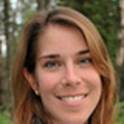| Present | Faculty Member, Western Washington University ‐ Western Expert | |
|
|
||
| Present | Associate Professor, Department of Biology, Western Washington University ‐ Department of Biology | |
|
|
||
Disciplines
Research Interests
Links
Contact Information
Phone: (360) 650-2920
Office: CB 282
Email:
